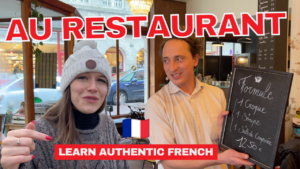Transcript
Welcome to another French lesson. Today, we're going to talk about a song. "Je veux de l'amour, de la joie, de la bonne humeur.
It's "Je veux" by Zaz. A few months ago, I made a video explaining that you shouldn't say "je veux" when you're at the bakery or in a shop, but that it's better to say "je voudrais", because it's more polite. You should never say "je veux" in French when addressing someone.
🚀 Transform your understanding of French IN 15 MINUTES A DAY
60 dialogues to boost your understanding of French 🇫🇷
And many of you commented on this video, telling me that Zaz was always saying "je veux" ("I want"). So I realized that this song is very well known abroad, almost even better known than in France. This song is quite interesting because it's really fast French. There are a lot of contractions in the sentences. It's really fast spoken French.
Even if you have a good level of French, this song can be complicated to understand because of the different contractions of words and the references Zaz makes.
That it refers to things you may not know. So we're going to analyze the lyrics together, and each time I'm going to put the complicated words in English for you, or give you pictures so that you understand what we're talking about. The first lyric of the song is "give me a suite at the Ritz, I don't want one".
The first difficulty is the Ritz. The Ritz is a palace, a grand hotel in Paris, a luxury hotel called "le Ritz". A suite in a hotel is a large room where, in addition to the bedroom, there's usually a living room or two, several rooms. It's a very large hotel room, generally found in luxury hotels, in palaces.
I don't want it, it's not for me, keep it. Chanel jewelry, I don't want it. Chanel, you probably know this brand. It's a big luxury brand that makes bags, jewelry and clothes.
It's a brand like Yves Saint Laurent, for example, or Dior. Here she says jewelry, so jewelry is earrings, necklaces, bracelets. Give me a limousine, what would I do with it? A limousine is a very, very long car, often used to get noticed in town.
There's a driver. Often, it's quite wealthy people who use it to go partying, for example. Again, she says, "If you gave me a limousine, what would I do with it? So I won't use it.
"Offer me some staff, what would I do with them?" Staff means household staff. These are people who will work for you. For example, cooking, cleaning, looking after your children. She doesn't want anyone working for her.
A mansion in Neuchâtel isn't for me. So it's not for me. Neuchâtel is a city where there are a lot of rich people in Switzerland.
There are a lot of millionaires who live there or have a house there. And a mansion is like a little castle. It's a big old house. So here again, she's saying that if she's offered a house among millionaires, she's not interested.
"Give me the Eiffel Tower, what would I do with it?" So the Eiffel Tower, I suppose you know what it is, it's the emblematic building of the city of Paris. So often, when we represent France, we use this symbol of the Eiffel Tower. Again, she says, even if we gave her the Eiffel Tower, she wouldn't know what to do with it. She's not interested.
So, after saying everything she didn't want in the first verse, we move on to the chorus where she talks about everything she loves, everything she wants. And so she says I want to assert herself.
I want love, joy and a good mood. Of course, it's I want love, joy and a good mood.
It's just that it contracts, so it's joy and love. So joy is joy, love is love and good mood is good mood. It's not your money that will make me happy. Here again, to keep the rhythm, there are contractions. So it's not your money that's going to make me happy. Your money won't make me happy. Your money won't make my happy.
What she means here is that it's not money that makes you happy. It's an expression used in French to say that money doesn't make you happy. There are more important things in life than money. Me, I want to die with my hand on my heart. Again, a contraction. I want to die with my hand on my heart. Here, she says I want to die with my hand on my heart. So here, it's not really a real expression in French. In French, there's another very similar expression. It means to be generous.
Here, she twists the expression a little. And what she certainly means is that she'd rather die with honor and honesty than die very rich. Let's discover my freedom together. Ensemble is "together". Liberté is freedom. So forget all your clichés.
Clichés in French are stereotypes, stereotype. These are preconceived ideas, here she's saying "forget your stereotypes, your preconceived ideas". And then she says welcome to my reality. Basically, it's welcome to my world. Welcome to my world. Welcome to my world, welcome into my reality.
This is the life I live, this is my reality. Let's move on to the second verse. I've had enough of your good manners. It's too much for me. Here again, d'vos bonnes manières, it's j'en ai marre de vos bonnes manières. She says your manners. She contracts. Good manners are politeness. It's a way of behaving politely. For example, when you enter a store, say hello.
Saying "I would like to" and not "I want to" is good manners. It's politeness. It's good manners. I'm sick of it, it means we don't want it anymore, "I can't stand it".
I eat with my hands and I'm like that. Me, I eat with my hands, I eat with my hands means she doesn't use cutlery, forks or knives, just her hands. And "chui" like that and "je suis" like that. So that's my way of being, that's who I am.
So I'm like, "this is who I am". I'm loud and I'm honest, excuse me. I'm loud and I'm honest. I'm loud and I'm honest. Again, the contraction. Talking loud is like I'm doing, it's raising my voice. It's almost like shouting. I talk loud.
To be frank or franche for a woman. Franc is the masculine adjective and franche is the feminine adjective. It means to be honest, to say what you think. In French, we say ne pas avoir sa langue dans sa poche. When you don't have your tongue in your pocket. We say what we think. We're frank.
When you think something, even if it's negative, you say it. For example, I can say, I'll be honest, those pants don't fit you. No more hypocrisy. I'm outta here. There's a double difficulty here: I'm outta here, I'm outta here. First the little contraction. And then se casser is a verb in slang, colloquial French, French slang or colloquial French.
Se casser means to leave. It's also a synonym for se barrer in colloquial French. So je me casse means I'm leaving. Hypocrisy means not being frank, not saying what you think. So when she says "fini l'hypocrisie", it means stop, finish, stop.
I've had enough of wooden tongues. Tongues, tongue and wood are wood. That's the literal translation. Politicians are often said to be speaking in tongues, which means they're trying to make everyone happy, to agree with everyone, and they don't say what they think in order to get elected, they're speaking in tongues.
So Zaz says she's fed up with people talking down to her, fed up with people who aren't sincere. Look at me, anyway, I don't blame you. Look at me, look at me, anyway, I'm not mad, at you. I'm not mad, at you. Anyway, it's anyway.
Anyway, it's anyway in English. Here, too, there's a double contraction, j'vous en veux pas, with both the "e" of "je" leaving and the negation. So "j'en veux pas" means "I don't blame you". So it can be complicated to understand. And I'm like that and I'm like that. This is who I am, I'm like that.
That's it for this video. In the description, I'm going to give you the full lyrics of the song and, above all, a link to listen to the music.
I'll see you soon.








